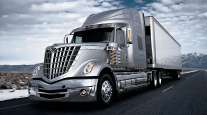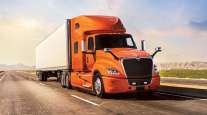VW to Buy Navistar Stake

This story appears in the Sept. 12 print edition of Transport Topics.
German automotive manufacturer Volkswagen AG is expanding its Truck & Bus division into the U.S. market by acquiring a stake in Navistar International Corp., a deal that also provides Navistar with more efficient procurement and better access to new technology for engines and other applications.
VW will make a $256 million equity investment for 16.6% of Navistar common stock, the companies said Sept. 6.
Andreas Renschler, head of VW’s global Truck & Bus division, joined Navistar CEO Troy Clarke at Navistar’s Lisle, Illinois, headquarters to announce the proposed transaction that is scheduled to close later this year or in early 2017, pending federal regulatory approval.
“Today’s announced alliance is a major milestone on our way to creating a global champion,” Renschler said of his company’s entry into the North American truck market.
“This deal will make us better, faster,” Clarke told Transport Topics several hours after the announcement of the deal, which was about six months in the making.
Volkswagen, best known for its cars, also owns European truck makers MAN SE and Scania AB.
The deal coincides with Navistar’s fiscal third-quarter earnings report, showing the company lost $34 million. Management has been making progress in recovering from its 2010-2012 engine difficulties related to a failed choice in the selection of technology.
It will pay $15.76 a share for its investment in Navistar. That is a 23.3% premium over the $12.78 three-month average closing price for Navistar through Sept. 2, the last trading day before the deal was unveiled. On Sept. 6, the price closed at $19.79.
When complete, the cash-for-new stock deal would give VW an ownership stake very similar to investors Carl Icahn and Mark Rachesky. Those two investors each have two seats on Navistar’s nine-member board, and Volkswagen Truck & Bus, based in Brunswick, Germany, will get that, too. Collectively, VW, Icahn and Rachesky will own about half of Navistar.
The procurement benefit comes from VW’s greater size. If Navistar can piggyback on Volkswagen’s purchasing power, it could save the company $500 million over five years, Navistar said.
In a presentation to investors, the companies said Volkswagen sells 179,000 commercial vehicles per year, worldwide, and Navistar’s business adds 84,000 units annually. The combination would be 263,000 global commercial vehicles a year, and the purchasing of components and raw materials would be handled through a joint venture, the companies said.
On technology sharing, the companies said their primary focus will be powertrain components: engines, transmissions and axles. The first engines are expected in 2019.
Clarke said Navistar’s N13 diesel truck engine is an example of the cooperation between the companies that predates last week’s deal. The N13, formerly the MaxxForce 13, is based on MAN SE’s 13-liter engine.
Clarke said the ability to use Volkswagen technology through a licensing agreement is highly desirable.
“Scale means a lot on technology because the costs [of research and development] are high,” he said, adding that Navistar and VW also share an interest in telematics and connected vehicles, and cooperation on those fronts could arise from the recent agreement.
As a solution to its engine problems, Navistar deepened its relationship with independent engine maker Cummins Inc. Clarke said he will offer the engine choices desired by his customer, whether Cummins, Volkswagen or a Navistar-VW fusion.
He said that European and North American heavy-duty engines are similar but not identical.
“It’s inevitable there would have to be some fine-tuning” in adapting a European engine for North America, Clarke said, adding that one production possibility might be Navistar’s Huntsville, Alabama, engine plant.
The Huntsville plant “is underutilized, and we’d love to fill it up,” Clarke said.
Therefore, the deal is seen as a problem for Cummins, analysts said.
“Volkswagen, through its Scania and MAN nameplates, has a full line of engine products, including a 15-liter engine,” analyst Michael Baudendistel wrote to clients of Stifel, Nicolaus & Co. “We believe that is critical when considering the long-term market share for Cummins because the lack of a 15-liter offering from some OEMs, such as Paccar, has supported Cummins’ market share because many truck customers prefer a 15-liter engine for their duty cycles.”
Baudendistel speculated the deal could be the first step toward a full acquisition of Navistar by VW. “The Volkswagen investment has a mandatory three-year holding period. We do not see a reason why that would preclude Volkswagen from acquiring all of Navistar before the end of that period,” he said.
Renschler and Clarke would neither guarantee nor rule out a merger.
“We’re excited to work together,” Clarke said. “Let’s leave the next chapter open for today.”
Renschler said “all options are open.”




